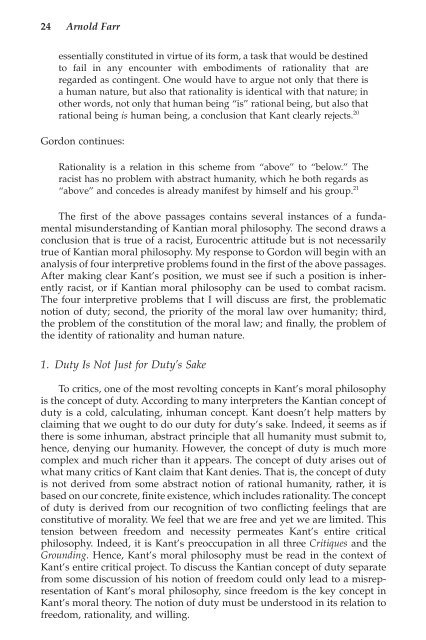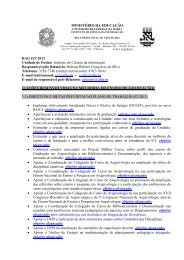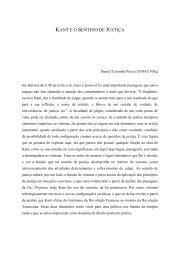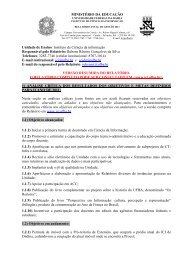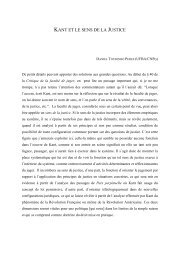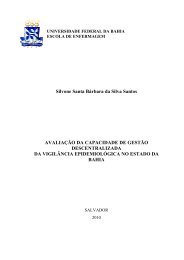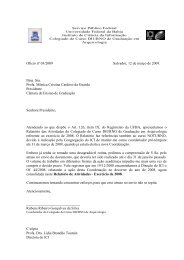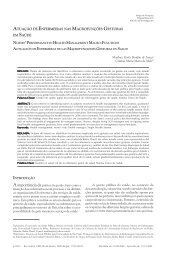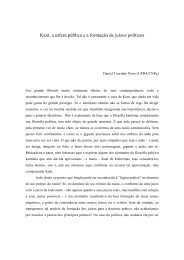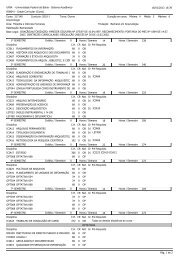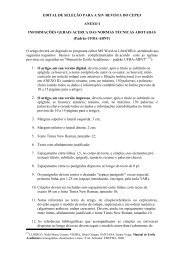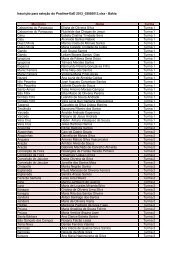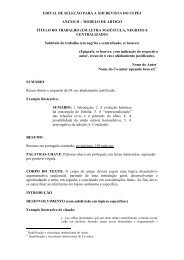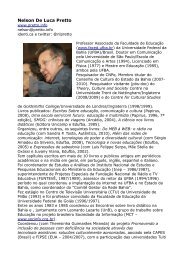24 Arnold Farressentially constituted in virtue <strong>of</strong> its form, a task that would be destined<strong>to</strong> fail in any encounter with embodiments <strong>of</strong> rationality that areregarded as contingent. One would have <strong>to</strong> argue not only that <strong>the</strong>re isa human nature, but also that rationality is identical with that nature; ino<strong>the</strong>r words, not only that human being “is” rational being, but also thatrational being is human being, a conclusion that Kant clearly rejects. 20Gordon continues:Rationality is a relation in this scheme from “above” <strong>to</strong> “below.” Theracist has no problem with abstract humanity, which he both regards as“above” and concedes is already manifest by himself and his group. 21The first <strong>of</strong> <strong>the</strong> above passages contains several instances <strong>of</strong> a fundamentalmisunderstanding <strong>of</strong> <strong>Kantian</strong> moral philosophy. The second draws aconclusion that is true <strong>of</strong> a racist, Eurocentric attitude but is not necessarilytrue <strong>of</strong> <strong>Kantian</strong> moral philosophy. My response <strong>to</strong> Gordon will begin with ananalysis <strong>of</strong> four interpretive problems found in <strong>the</strong> first <strong>of</strong> <strong>the</strong> above passages.After making clear Kant’s position, we must see if such a position is inherentlyracist, or if <strong>Kantian</strong> moral philosophy can be used <strong>to</strong> combat racism.The four interpretive problems that I will discuss are first, <strong>the</strong> problematicnotion <strong>of</strong> duty; second, <strong>the</strong> priority <strong>of</strong> <strong>the</strong> moral law over humanity; third,<strong>the</strong> problem <strong>of</strong> <strong>the</strong> constitution <strong>of</strong> <strong>the</strong> moral law; and finally, <strong>the</strong> problem <strong>of</strong><strong>the</strong> identity <strong>of</strong> rationality and human nature.1. Duty Is Not Just for Duty’s SakeTo critics, one <strong>of</strong> <strong>the</strong> most revolting concepts in Kant’s moral philosophyis <strong>the</strong> concept <strong>of</strong> duty. According <strong>to</strong> many interpreters <strong>the</strong> <strong>Kantian</strong> concept <strong>of</strong>duty is a cold, calculating, inhuman concept. Kant doesn’t help matters byclaiming that we ought <strong>to</strong> do our duty for duty’s sake. Indeed, it seems as if<strong>the</strong>re is some inhuman, abstract principle that all humanity must submit <strong>to</strong>,hence, denying our humanity. However, <strong>the</strong> concept <strong>of</strong> duty is much morecomplex and much richer than it appears. The concept <strong>of</strong> duty arises out <strong>of</strong>what many critics <strong>of</strong> Kant claim that Kant denies. That is, <strong>the</strong> concept <strong>of</strong> dutyis not derived from some abstract notion <strong>of</strong> rational humanity, ra<strong>the</strong>r, it isbased on our concrete, finite existence, which includes rationality. The concept<strong>of</strong> duty is derived from our recognition <strong>of</strong> two conflicting feelings that areconstitutive <strong>of</strong> morality. We feel that we are free and yet we are limited. Thistension between freedom and necessity permeates Kant’s entire criticalphilosophy. Indeed, it is Kant’s preoccupation in all three Critiques and <strong>the</strong>Grounding. Hence, Kant’s moral philosophy must be read in <strong>the</strong> context <strong>of</strong>Kant’s entire critical project. To discuss <strong>the</strong> <strong>Kantian</strong> concept <strong>of</strong> duty separatefrom some discussion <strong>of</strong> his notion <strong>of</strong> freedom could only lead <strong>to</strong> a misrepresentation<strong>of</strong> Kant’s moral philosophy, since freedom is <strong>the</strong> key concept inKant’s moral <strong>the</strong>ory. The notion <strong>of</strong> duty must be unders<strong>to</strong>od in its relation t<strong>of</strong>reedom, rationality, and willing.
<strong>Philosophy</strong> <strong>of</strong> <strong>Race</strong> and <strong>the</strong> Categorical Imperative 25For Kant, rational creatures are simply creatures that are not entirelydetermined by sensuous impulses. Morality is as function <strong>of</strong> rationality <strong>to</strong><strong>the</strong> extent that as moral agents we strive <strong>to</strong> make our sensuous impulses conform<strong>to</strong> some higher principle. It seems obvious that at times our sensuousimpulses must be restricted. It may be argued that even racism is based onone’s failure <strong>to</strong> control one’s sensuous impulses, that is, one’s impulses ordesire <strong>to</strong> dominate and oppress ano<strong>the</strong>r group. If <strong>the</strong> racist is <strong>to</strong> cease beinga racist, he must change his or her way <strong>of</strong> thinking about those <strong>of</strong> a differentrace, that is, he must choose ano<strong>the</strong>r way <strong>of</strong> being. This choice is based onsome higher principle, such as that it is wrong <strong>to</strong> discriminate against o<strong>the</strong>rs<strong>of</strong> <strong>the</strong> basis <strong>of</strong> racial difference. This principle takes on an objective, universalstatus when <strong>the</strong> former racist concludes that “all persons ought notdiscriminate against o<strong>the</strong>rs on <strong>the</strong> basis <strong>of</strong> racial (physical) difference.” Thisprinciple is a maxim that determines <strong>the</strong> behavior <strong>of</strong> <strong>the</strong> person invoking <strong>the</strong>maxim. To <strong>the</strong> extent that such a principle should apply <strong>to</strong> all persons at alltimes it is a duty.One may re<strong>to</strong>rt, “<strong>the</strong> above maxim determines <strong>the</strong> behavior <strong>of</strong> <strong>the</strong> onewho holds such a maxim but it does not change <strong>the</strong> way that one feels aboutpeople <strong>of</strong> o<strong>the</strong>r races, that is, one may decide that it is wrong <strong>to</strong> discriminateagainst blacks but may still hate blacks.” There are two approaches that onemay take in addressing this rebuttal. First, one may point out that this maximis still subject <strong>to</strong> a higher principle, for example, “it is wrong <strong>to</strong> hate peopleon <strong>the</strong> basis <strong>of</strong> racial difference.” This principle is still problematic <strong>to</strong> <strong>the</strong>extent that although one may know that it is wrong <strong>to</strong> hate o<strong>the</strong>rs on <strong>the</strong> basis<strong>of</strong> racial difference, one may still hate o<strong>the</strong>rs <strong>of</strong> different races. However, Kantmakes it clear that morality is not based on what we like or find desirable.Morality <strong>of</strong>ten comes in<strong>to</strong> conflict with our feelings and desires. What is rightmay not be what we find pleasant, hence, duty is <strong>the</strong> obligation <strong>to</strong> do whatis right even if one does not find it pleasant. For example, duty is my recognition<strong>of</strong> my obligation not <strong>to</strong> <strong>to</strong>rture my neighbor even if such an act wouldbring me great pleasure. Feelings are not bound by <strong>the</strong> moral law in that Ihave no control over <strong>the</strong>m. However, I do have control over <strong>the</strong> way in whichI respond <strong>to</strong> my feelings.This brings us <strong>to</strong> <strong>the</strong> second way in which one may address <strong>the</strong> aboverebuttal. In <strong>the</strong> Grounding, Kant claims that <strong>the</strong> only thing that is good withoutqualification is a good will. 22 The cultivation <strong>of</strong> a good will is <strong>the</strong> central <strong>the</strong>me<strong>of</strong> <strong>the</strong> Grounding. We hope that right action will follow from a good will, butthis opens up a whole new set <strong>of</strong> problems. In recognizing that <strong>the</strong> will is <strong>the</strong>only thing that is good without qualification, Kant recognizes that althoughwe are not completely determined by <strong>the</strong> sensible impulses, we are, indeed,influenced by <strong>the</strong>m. That is, as members <strong>of</strong> <strong>the</strong> intelligible world we arecapable <strong>of</strong> transcending <strong>the</strong> sensible world <strong>to</strong> <strong>the</strong> extent that we can will whatis not <strong>the</strong> case but ought <strong>to</strong> be <strong>the</strong> case. For example, even in <strong>the</strong> absence <strong>of</strong>justice in <strong>the</strong> sensible world we can envision a just society and strive <strong>to</strong>produce such. However, as members <strong>of</strong> <strong>the</strong> sensible world <strong>the</strong>re are manylimitations and contingencies that interfere with our ability <strong>to</strong> produce a justsociety. As finite, imperfect beings, our reality does not measure up <strong>to</strong> ourconcept <strong>of</strong> what ought <strong>to</strong> be <strong>the</strong> case. Even <strong>the</strong> person who wills a nonracist


